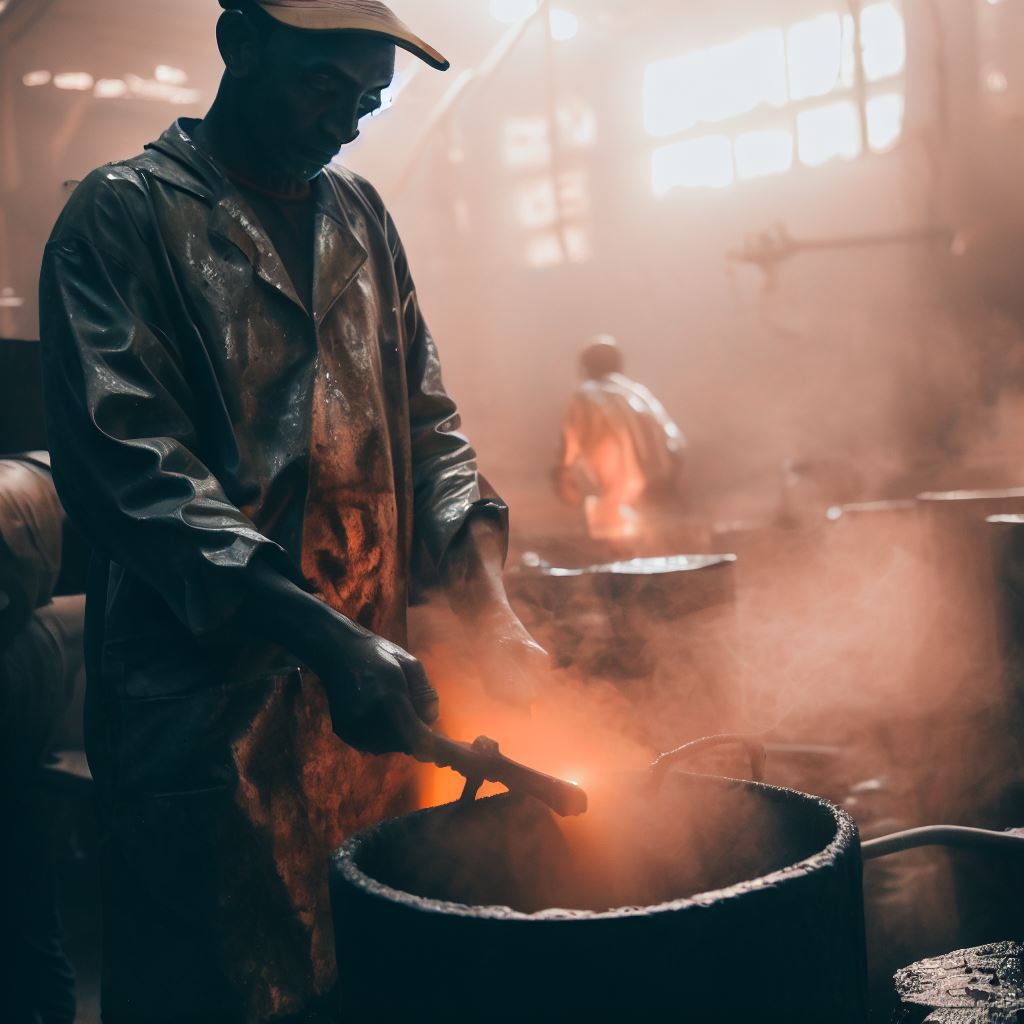Introduction
In today’s ever-evolving job market, the role of a coating technician has emerged as a promising career choice, driven by the increasing demand for their expertise across diverse industries.
This blog post delves into the exciting journey of “Building a Career as a Coating Technician.”
Coating technicians play a pivotal role in protecting and enhancing the longevity of various products, from automotive finishes to cutting-edge electronics.
Their skillset encompasses a wide range of applications, including painting, powder coating, and corrosion protection.
As technology advances, so does the demand for skilled professionals in this field.
Whether you’re just starting your career or seeking a change, embarking on the path of a coating technician promises a world of opportunities.
Stay tuned as we explore the ins and outs of this dynamic profession, uncovering the skills, training, and potential it holds for those ready to take the plunge.
What is a Coating Technician?
In the world of coatings, a career as a coating technician is an invaluable pursuit.
These skilled professionals are the unsung heroes behind the protective layers that safeguard surfaces and products across diverse industries.
As a coating technician, your responsibilities encompass a range of critical tasks.
From meticulously preparing surfaces for coating application to ensuring perfect adhesion and employing specialized tools, your precision is the key to success.
Thorough inspections and diligent defect repairs ensure top-notch quality.
The impact of coating technology reverberates across sectors. In automotive, you preserve vehicles against corrosion and enhance their aesthetics.
In aerospace, you protect aircraft against environmental stresses, ensuring passenger safety.
Also in construction, you fortify structures against weathering and rust, extending their lifespan. And in manufacturing, you elevate product performance and durability.
But the significance of coating technology goes beyond protection. It also enhances aesthetics, contributing to consumer preferences in industries where appearance matters most.
Furthermore, it champions sustainability, reducing resource consumption and waste generation by prolonging the life of products and structures.
Moreover, coatings can be eco-friendly by offering insulation properties that boost energy efficiency.
Heat-reflective coatings on buildings, for instance, reduce the need for excessive air conditioning, conserving energy and curbing carbon emissions.
In fact, building a career as a coating technician means becoming a guardian of surfaces, an artist of aesthetics, and a champion of sustainability.
This profession is indispensable, with a ripple effect that spans industries, contributing to longevity, eco-consciousness, and customer satisfaction.
Education and Training Requirements
When it comes to building a successful career as a coating technician, having the right educational background is crucial.
While there isn’t a specific degree required to become a coating technician, there are certain educational requirements that can greatly enhance your skills and knowledge in this field.
1. High School Diploma or GED
- Obtaining a high school diploma or GED is the first step towards becoming a coating technician.
2. Post-Secondary Education
- Although not mandatory, acquiring post-secondary education in a related field can be highly advantageous.
- Some coating technicians pursue associate’s or bachelor’s degrees in areas like chemistry, engineering, or material science.
3. Vocational or Technical Training
- Many aspiring coating technicians opt for vocational or technical training programs.
- These programs provide hands-on experience and in-depth knowledge of coating techniques and technologies.
4. Certifications
- Obtaining certifications can significantly enhance the credibility and employability of a coating technician.
- The Society for Protective Coatings (SSPC) offers various certifications like Protective Coating Specialist (PCS) and Concrete Coating Inspector (CCI).
- Other industry-recognized certifications include NACE International’s Coating Inspector Program (CIP) and ICRI’s Concrete Surface Repair Technician (CSRT).
5. Training Programs
- Aspiring coating technicians can also benefit from specialized training programs offered by manufacturers, industry organizations, and trade schools.
- These programs focus on teaching the latest coating technologies, application techniques, safety protocols, and industry best practices.
6. On-the-Job Experience
- While education and certifications are vital, hands-on experience is equally important for a coating technician’s career growth.
- Gaining experience through apprenticeships, internships, or entry-level positions can help develop practical skills and industry-specific knowledge.
7. Continuous Learning
- In the rapidly evolving coating industry, staying updated with the latest advancements is crucial for a successful career.
- Coating technicians should engage in continuous learning through attending workshops, conferences, and online courses.
- Keeping up with industry publications and subscribing to relevant newsletters can also provide valuable insights.
8. Safety Training
- Safety is a top priority in the coating industry, and technicians must be well-versed in safety protocols and practices.
- Participating in safety training programs such as OSHA certifications ensures a coating technician’s ability to work safely.
While education and training requirements provide a solid foundation, it’s important to remember that building a successful career as a coating technician also requires dedication, attention to detail, and a passion for the field.
By continuously expanding knowledge and skills, pursuing certifications, and gaining practical experience, individuals can embark on a rewarding journey as coating technicians.
Read: Understanding Cultural Sensitivity in Hotel Reception

Skills and Qualities
Building a successful career as a coating technician requires a combination of essential skills and qualities.
These technical competencies and soft skills are critical for ensuring high-quality work and maintaining a safe and efficient work environment.
1. Knowledge of Coating Materials
- A coating technician should have a deep understanding of various coating materials and their properties.
- Knowing the characteristics of different coatings helps in selecting the right materials for specific projects.
- Understanding the compatibility of coatings with different surfaces is also crucial for successful application.
2. Safety Protocols
- Coating technicians must prioritize safety in their work.
- Being knowledgeable about safety protocols and adhering to them is vital to prevent accidents and injuries.
- Knowledge of hazard communication, personal protective equipment, and safe handling of chemicals is essential.
3. Equipment Operation
- Coating technicians work with various tools and equipment, such as spray guns, sanding machines, and drying ovens.
- They need to be skilled in the operation, maintenance, and troubleshooting of these machinery.
- Proper equipment usage ensures accurate application of coatings and enhances overall efficiency.
4. Attention to Detail
- Being detail-oriented is crucial for coating technicians.
- They must pay close attention to surface preparation, coating thickness, and drying times.
- Even a small mistake or oversight can compromise the quality and durability of the coating.
5. Problem-Solving Abilities
- Coating technicians often encounter challenges during the application process.
- Having strong problem-solving skills enables them to identify and overcome issues.
- They must be capable of troubleshooting equipment malfunctions, addressing coating defects, and adapting to unexpected situations.
6. Teamwork
- Collaboration is essential in many coating projects.
- Coating technicians often work alongside other professionals, including painters, project managers, and quality control inspectors.
- Effectively communicating and coordinating with team members ensures successful project completion.
Developing the necessary skills and qualities for a successful career as a coating technician requires a combination of technical competencies and soft skills.
Having a deep understanding of coating materials, following safety protocols, and being proficient in equipment operation are fundamental technical competencies.
Additionally, attention to detail, problem-solving abilities, and teamwork help coating technicians overcome challenges, deliver high-quality work, and contribute to project success.
By continuously honing and expanding these skills, coating technicians can establish themselves as valuable professionals in the industry.
Read: Hotel Receptionist Roles in Nigeria’s Tourism Growth
Job Opportunities and Career Growth
Coating technicians are the unsung heroes across various industries, including manufacturing, construction, and automotive.
Their expertise in applying protective coatings elevates product durability and aesthetics.
Starting as entry-level coating applicators, they embark on a journey of continuous growth.
With experience and training, they ascend to supervisory or managerial roles, ensuring quality control and project management.
For those with the right training and certifications, the sky’s the limit.
Specialization beckons; some choose the path of protective coatings, finding opportunities in oil and gas, infrastructure, and aerospace.
Others venture into research and development, shaping the future of coatings technology alongside scientists and engineers.
In this dynamic field, the potential for a fulfilling and rewarding career is limitless.
Read: Managing Stress: A Hotel Receptionist’s Handbook
Salary and Benefits
Coating technicians are an essential part of various industries, including automotive, construction, and manufacturing.
With their expertise in applying protective coatings to surfaces, they play a crucial role in ensuring durability, aesthetics, and functionality.
Alongside the technical skills required, one important consideration for individuals pursuing a career in coating technology is the salary and benefits potential.
Overview of Average Salary Range
Coating technicians can expect a competitive salary that reflects the specialized nature of their work.
The average salary range for coating technicians falls between N200,000 and N350,000 per month., depending on various factors such as experience, location, and industry.
Starting salaries for entry-level coating technicians tend to be around N2.4 million and N4.2 million per year, with the potential for significant growth as experience and skills are gained.
Coating technicians with several years of experience can earn a salary of up to Y per year.
Potential for Additional Benefits
While salary is an important factor, coating technicians can also benefit from additional perks and benefits that enhance their overall compensation package.
Some common benefits offered to coating technicians include:
- Health Insurance: Many employers provide comprehensive health insurance plans for their coating technicians, ensuring they have access to medical care and reducing out-of-pocket expenses.
- Retirement Plans: Some companies offer retirement plans like 401(k) or pension schemes, enabling coating technicians to save for their future and enjoy financial security.
- Professional Development Opportunities: The field of coating technology is continually evolving, and companies often invest in their employees by providing opportunities for professional development and training. This allows coating technicians to expand their skills and advance in their careers.
- Flexible Working Arrangements: With the growing trend of work-life balance, many companies offer flexible working arrangements, such as remote work or flexible hours, to accommodate the needs and preferences of coating technicians.
Influence of Factors on Salary Levels
Several factors have an impact on the salary levels of coating technicians. These include:
- Experience: As with many professions, experience plays a significant role in determining salary. Coating technicians with a higher level of experience can negotiate higher salaries due to their expertise.
- Location: The geographical location can also influence salary ranges. Coating technicians working in major cities or areas with a high cost of living tend to earn higher salaries compared to those in rural or less expensive regions.
- Industry: Different industries have different demands for coating technicians, which can affect salary levels. For example, the automotive industry often offers higher salaries compared to construction or manufacturing.
- Additional Certifications: Coating technicians who obtain additional certifications or specialize in specific coating techniques or materials may command higher salaries due to their increased value and expertise.
In summary, coating technicians can expect a competitive salary range, with additional benefits like health insurance, retirement plans, and professional development opportunities.
Salary levels are influenced by factors such as experience, location, industry, and certifications.
As the demand for coating technicians continues to grow, individuals pursuing this career path can look forward to a rewarding and well-compensated journey.
Read: Hotel Receptionist Etiquette: A Guide for Beginners
Challenges and Rewards
Being a coating technician is a challenging yet rewarding career path.
While there are difficulties that come with the job, there are also countless rewards that make it all worth it.
Challenges
- Hazardous Environments: Coating technicians often work in hazardous environments, exposed to potentially harmful chemicals and fumes.
- Tight Deadlines: Meeting deadlines can be a challenge, especially when projects involve large surfaces or complex coatings.
- Physical Demands: The job requires physical stamina as coating technicians may need to stand, bend, or lift heavy equipment for extended periods.
- Continuous Learning: Keeping up with advancements in coating technologies requires ongoing education and training.
- Working Conditions: The nature of the work may involve long hours, working at heights or in confined spaces.
- Quality Control: Maintaining quality control throughout the coating process is essential, which adds another layer of complexity to the job.
Rewards
Although being a coating technician presents challenges, the rewards of this career are numerous:
- Job Security: The need for coating technicians is constant, ensuring a steady demand for skilled professionals in the field.
- Opportunities for Growth: As a coating technician gains experience and proficiency, they can explore various specializations within the industry.
- Tangible Results: Seeing the transformation of a surface after applying a coating provides immense satisfaction and a sense of accomplishment.
- Competitive Compensation: Coating technicians are well-compensated for their expertise, making it a financially rewarding career choice.
- Career Advancement: With continuous learning, coating technicians can progress to supervisory or managerial roles, taking on more responsibilities.
- Contribution to Industry: Coating technicians play a vital role in protecting surfaces, preventing corrosion, and enhancing the lifespan of various structures.
- Artistic Expression: Coating technicians can employ their creativity in creating decorative finishes or exploring innovative coating techniques.
- Collaborative Work Environment: Many coating projects require teamwork, fostering a sense of camaraderie among technicians and other professionals.
In short, the challenges faced by coating technicians are significant, but the rewards make it a fulfilling career choice.
From the job security and opportunities for growth to the satisfaction of witnessing tangible results, this profession offers a unique blend of technical expertise and artistic expression.
If you’re looking for a career that combines hands-on work with continuous learning and growth, becoming a coating technician might be the path for you.
Conclusion
A career as a coating technician offers numerous opportunities for personal and professional growth.
From learning and mastering different coating techniques to playing a vital role in various industries, this field provides an exciting and fulfilling career path.
Throughout this blog post, we discussed the essential skills, education, and experience required to become a successful coating technician.
We explored the wide range of industries that require coating technicians, such as automotive, aerospace, construction, and manufacturing.
Additionally, we highlighted the potential career progression and salary prospects in this field. As a coating technician, you can continue to enhance your skills and move up the ladder to positions like coating supervisor or quality control specialist.
If you are considering a career as a coating technician, there are various resources available for further exploration.
You can seek apprenticeship programs, vocational training, or pursue a degree in a related field like materials science or chemical engineering.
Building a career as a coating technician can be incredibly rewarding.
Not only do you contribute to the production of durable and beautiful surfaces, but you also play a crucial role in ensuring the quality and longevity of countless products and structures.
So, why not consider a career as a coating technician? Embrace the challenges, learn continuously, and make a difference in various industries.
Embark on an exciting journey towards professional success, personal growth, and a fulfilling career that awaits you in this field!




